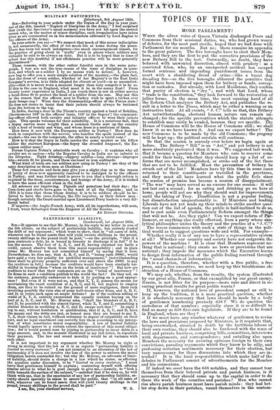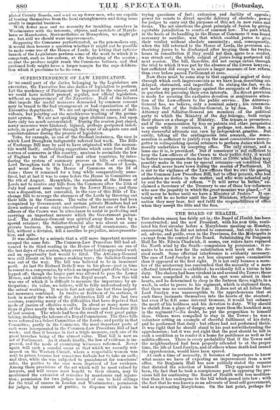TOPICS OF THE DIY.
MORE PARLIAMENT!
WREN the silver voice of Queen -Victoria discharged Peers and Commons from their sessional duties, we, who had grown weary of debates, for the most part sterile, hoped that we had done with Parliament for six months. But no; there remainsbn appendix to the great palaver. The five boroughs have to elect their Mem- bers, and they are the first to put the corrective .provisions of the new Bribery Bill to the test. Outwardly, no doubt, they have behaved with unwonted discretion, almost with prudery : as a convicted felon, who, by an unexpected accident has escaped formal sentence and impending punishment issues from the court with a shuddering dread of crime—like a burnt dog dreading fire—so the five boroughs abhorred the penalties that might have been imposed upon them for bribery or bands, corrup- tion or cockades. But already, with Lord Maidstone, they confess that purity of election is " dry " ; and with that Lord, whose " trade is the constitution," they look forward to the restoration of jollier forms. In the mean time, the most cunning hand of all the Reform Club analyzes the Bribery Act, and publishes the re- sult in a letter to the Times, which may be either a warning or an instructive hint. At all events, "J. C. tells us that, this Bribery Act notwithstanding, electoral human nature can remain un- changed; for the specific preventives which the statute attempts to establish may easily be evaded, because they are specific. The House of Commons will be the House of Commons still ; we shall know it as we have known it. And can we expect better P The new Commons is to be made by the old Commons; the progeny will be kept up ; the political scrofula will continue. So that the session is scarcely over before we begin again as before. The Bribery " Bill" is an "Act," and yet bribery is not snore absolutely prevented than it was. We suggested last week, that it became a question for Members who care to recover some credit for their body, whether they should keep up a list of re- forms that are never accomplished, or strike out of the list those that are not to be fulfilled. Must the prevention of bribery be struck out of the list P Members have by this time in some cases returned to their constituents or travelled in the provinces, and they must all have learned what the public feels since the session of promise has become a session of disappointment. "The war" may have served as an excuse for one session : it will not last out a second ; for as eating and drinking go on here at home, people will not see why they should wait for improvements until the taking of Troy. Disaffection is not a popular feeling, but dissatisfaction unquestionably is. If Ministers and leading Liberals have not yet made up their minds to strike another ques- tion out of the list of agenda, the public is half-inclined to de so, and to east aside even Parliamentary Reform amongst the things that will not be. Are they right ? Can we expect reform of 1,ar- liament, or anything else really effectual, from a party whose ana- lytical philosopher unites the theory and the practice of a "J. 0."1' The recess commences with such a state of things in the poli- tical world as to suggest questions wide mid wild. For example— Whether really it is of any use to have a representative system• at all ? Whether our country and society have not outgrown the powers of the machine ? It is clear that Members represent no- thing that is national ; they create no laws or provisions that are national ; they impede the measures which the Executive learns to design from information of the public feeling received through the "usual channels of information.'
It is a question, therefore, whether with a free public, a free press, and a free executive, we need keep up this troublesome ob- struction of a House of Commons.
We may ask, whether, from the results, the system illustrated by our great ally, France, or that exemplified by our great enemy, Russia, is not fitter for its purpose—more sure and direct in se- curing practical results for great public wants ?
If, however, the national love of precedent compel us still to keep up the tradition, it is a more practical question' whether it is absolutely necessary that laws should be made by a body of gentlemen numbering precisely 658 ? We do question the sacredness of that number ; especially since it is so difficult to find as many as 658 first-rate legislators. If they are to be found in England, where are they ?
If we must have any number whatever of gentlemen to revise the laws and provisions proposed by Ministers, is it requisite that, being overworked, strained to death by the factitious labour of their own routine, they should also be burdened with the mass of local and private business, comprising bills, committees, interviews with departments, and correspondence ; and entailing also upon Members the necessity for avowing opinions foreign to their own convictions, parading arguments which they know to be silly, and professing sectarian sentiments necessary for their election, but very unnecessary for those discussions into which they are in- truded? It is the local responsibilities which make half of the debates in Parliament consist of advertisements for the Member and his connexions.
If indeed we must have the 658 notables, and they cannot tear themselves from their beloved private and parish business, is it necessary that they should come up to the capital in order to do there the work of the counties and parishes ? Men who cannot rise above parish business must have parish minds : they had bet- ter stop down in their parishes, vaunt themselves in the ocateni- plated County Boards, and send us up -fewer men, who are capable of tearing themselves from the local entanglements and doing some credit to imperial business. -With fewer men and no necessity for 'troubling ourselves in Westminster with the intereste,'. objects, and'crotehets.of Maryle-1 botittor Manchester, , Merionethshire or Morayshire, we Might get but still we should want ii4provetnents. r,rstipposing the Comnsonti • perfeetiiniated, as the pen-makers say, it-suloidd then become a Aitieistiottlwhether it might net be possible tebuifake some use-of the.House of Lords, by leftist,'b that Inferior branch of the Legislature perform some of the work to which it is competent, such as ,law-reform, at the beginning Of the session ; so: that the:produce miglit .reetch Cotamons 'betimes, and that proffisuid body might haven larger inargin for the sage delibera- tion which it proclaithslo be-its own.



























 Previous page
Previous page